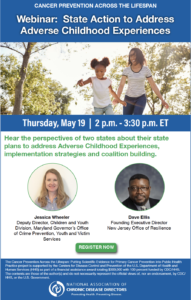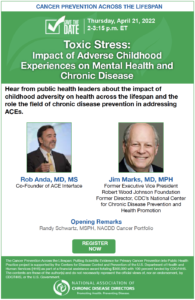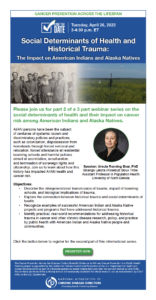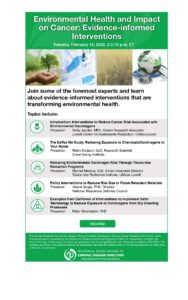CANCER
Cancer Prevention Across the Lifespan
NACDD is working with CDC’s Division of Cancer Prevention and Control to foster innovative public health approaches to cancer prevention. Building on past work, the purpose of this five-year project is to develop resources that will empower public health practitioners and community leaders to implement evidence-based strategies to reduce cancer risk in their communities by making it easier for people to reduce exposure to carcinogens and adopt healthy behaviors where they live, work, learn, and play.
Year One Project Focus Areas
 (photo credit: https://www.pedbikeimages.org / NYCDOT)
(photo credit: https://www.pedbikeimages.org / NYCDOT)
Webinars
Complete Streets Webinar – July 22, 2019
Supporting Evidence
Resources
July 23, 2020 Webinar: Supporting Family Caregivers in America: Collaborative Opportunities for State, Local, Tribal and Territorial Health Departments
Webinar attendees were ask to complete a brief evaluation of the webinar. The results of those evaluations and a profile of attendees are included in this report.
Resources
- The Alzheimer’s Association is a leader in providing resources to caregivers and their families.
- The State of Aging and Health in America provides a snapshot of progress in promoting prevention, improving the health and well-being of older adults, and reducing behaviors that contribute to premature death and disability.
- How to effectively communicate about health with older adults and their caregivers

- This 2020 study by AARP and the National Alliance for Caregiving highlights the varied experiences and situations of caregivers in the United States and points to the impacts many caregivers face as a result of their stepping up to help family and friends.
- CDC offers resources and guidance for caregivers for a variety of different health issues
- NACDD Issue Brief on Caregiving for Family and Friends: A Public Health Issue
- AARP – Family Caregiving
- ACS – Caregivers and Family
- CDC – Caregiving Infographic
- National Alliance for Caregiving
- Supporting Family Caregivers
Literature
- NASEM – Families Caring for an Aging America
- Bouldin et al. Financial and health barriers and caregiving-related difficulties among rural and urban caregivers. The Journal of Rural Health. 2018;34:263-274.
- “A 21st Century Job Description For Family Caregiving,” Health Affairs Blog, June 14, 2019.
- This report from the National Alliance for Caregiving (NAC) in partnership with Caring Across Generations illuminates the challenges facing working parents who are providing intergenerational care.
- The report From Insight to Advocacy: Addressing Family Caregivers as a National Public Health Issue, from the National Alliance for Caregiving, describes family caregiving and the major caregiving issues affecting public health, including actions that can be taken specifically by state and local coalitions, health systems, and policymakers. The report also cites common data sources, identifies barriers to providing care within the aging network, and offers strategies on what caregiving advocates can do to get engaged.
- Home Alone Revisited: Family Caregivers Providing Complex Care
- In Support of Family Caregivers: Snapshots of 5 States
- “A 21st Century Job Description For Family Caregiving, ” Health Affairs Blog, June 14, 2019.
- Breaking New Ground: Supporting Employed Family Caregivers with Workplace Leave Policies
- Home Alone Revisited: Family Caregivers Providing Complex Care
Year 2 Project Focus Areas
Years 3 Through 5 Project Focus Areas
Earlier in this five-year project, a CPAL strategic planning meeting led to the identification of four areas of focus:
- Opportunities to Reduce Cancer Risk Among American Indian and Alaska Native (AI/AN) Populations
- Opportunities to Reduce Cancer Risk Among Hispanic and Latino Populations
- The Role of the Chronic Disease Prevention Field in Addressing Adversity and Toxic Stress in Childhood
- Environmental Health and Cancer Risk
A variety of activities have supported these workgroups during years 3-5, including SME interviews, a literature search, webinars, and briefs. The below resources are reflective of the combined activities from years 3, 4, and 5. More information about the previous work of the CPAL workgroup is available on the CDC website.
Adverse Childhood Experiences
ACEs are common. Approximately 61% of adults surveyed across 25 states reported that they had experienced at least one type of ACE, and nearly 1 in 6 reported they had experienced four or more types of ACEs. Preventing ACEs could potentially reduce a large number of health conditions. Prolonged stress, or toxic stress, can affect neurological development. Children growing up with toxic stress may have difficulty forming healthy and stable relationships and serve as the basis for intergenerational transmission. (Centers for Disease Control and Prevention, Division of Injury Prevention and Control).
Oct. 19, 2022
Early Childhood Adversity and Toxic Stress and the Impacts of Racism on the Foundations of Health
Associated Materials:
Sept. 27, 2022
The Life-Course Effects of Childhood Adversity
Associated Materials:
May 19, 2022
State Actions to Address Adverse Childhood Experiences
April 21, 2022
Toxic Stress: Impact of Adverse Childhood Experiences on Mental Health and Chronic Disease
Additional Resources on ACES
- The Adverse Childhood Experience Study: https://www.ajpmonline.org/article/S0749-3797(98)00017-8/fulltext
- ACE Interface: https://www.aceinterface.com/
- BRFSS ACE data: https://www.cdc.gov/violenceprevention/aces/ace-brfss.html
- CDC: https://www.cdc.gov/violenceprevention/aces/index.html
- Center on the Developing Child, Harvard University: https://developingchild.harvard.edu/
- Positive and Adverse Childhood Experiences (PACES): https://www.acesconnectioninfo.com/
- Prevention Training: https://vetoviolence.cdc.gov/apps/aces-training/#/#top
- Trauma Informed Care: https://www.traumainformedcare.chcs.org/what-is-trauma-informed-care/
- ASTHO: https://www.astho.org/search?q=adverse+childhood+experiences
- Connecticut:
- Georgia: https://abuse.publichealth.gsu.edu/essentials/?__cf_chl_jschl_tk__=pmd_fUtQhSqosNULYOx44QAL3F.vnavczlqg5zk8FBCuamU-1631028648-0-gqNtZGzNAeWjcnBszQkR
- Massachusetts: https://www.mass.gov/info-details/massachusetts-essentials-for-childhood-initiative
- Michigan: https://www.miace.org
- Minnesota: https://www.health.state.mn.us/communities/ace/index.html
American Indian/Alaska Native
This site includes a systematic review of the literature to create a map of available evidence on the literature from 2020-2021. The purpose of the original review was to characterize the current state of the literature around social determinants of health and cancer in AIAN populations. This site also includes results of webinars and listening sessions with tribal elders and leaders. Read the report, Frameworks for Indigenous Evaluation: A Literature Review & Annotated Bibliography
June 14, 2023
Working with Indian Country to Ensure Culturally Appropriate Research, Policies, and Programs
March 29, 2023
Resilience as a Mediator for Cancer Prevention among American Indian and Alaska Native People
February 9, 2023
Successful Local Models and Approaches for Cancer Prevention in American Indian and Alaska Native Communities
July 25, 2022
Listening Session: Cancer Prevention Research Priorities and Dissemination
In partnership with the International Association for Indigenous Aging, NACDD convened a listening session to hear from select leaders in American Indian health about Cancer Prevention Research Among American Indian and Alaska Native Populations. The listening session discussed research priorities and dissemination.
Mainstream models and approaches to research and engagement can be a poor fit for tribes and Alaska Native communities and people. Existing Indigenous principles and approaches to research are unique and differ from traditional Western approaches. Read the listening session summary to learn more.
June 21, 2022
Indigenous Evaluation and Research Frameworks
April 26, 2022
Social Determinants of Health and Historical Trauma: The Impact on American Indians and Alaska Natives
February 22, 2022
Social Determinants of Health: Cancer Risk Among American Indian and Alaska Native Populations
Environmental Health
In collaboration with the CDC Cancer Prevention Across the Lifespan workgroup, NACDD is collaborating with the Lowell Center for Sustainable Products at the University of Massachusetts Lowell to present a series of webinars.
Learn more: https://www.uml.edu/Research/Lowell-Center/Chemicals-Materials-Products/Sustainable-Products/
June 23, 2022
Engaging Cancer and Environment-Focused Organizations in Reducing Environmental Carcinogens
October 20, 2021
Environmental Chemicals and Impact on Cancer Prevention
Associated Materials:
PowerPoint slides
February 15, 2022
Environmental Health and Impact on Cancer: Evidence-Informed Interventions
Working with Kognito, a health simulation company, and Westat, a research and analysis firm, NACDD is exploring innovative ways for healthcare providers to communicate complex health information about early onset breast cancer and breast health to women younger than 45 years of age who are making decisions about their care. The objective is development of two role-play conversations with virtual humans, one for providers for educational purposes and another for women under 45 years of age who have questions about their risk factors for breast cancer.
The Cancer Prevention Across the Lifespan project will develop innovative resources to empower public health practitioners and community leaders to implement evidence-based strategies to reduce cancer risk in their communities by making it easier for people to reduce exposure to carcinogens and adopt healthy behaviors where they live, work, learn, and play.
This project builds upon past work of the CDC Cancer Prevention and Control’s Cancer Prevention Across the Lifespan Workgroup (CPAL), which included collaboration with NACDD to conduct literature reviews and convene meetings of experts to identify factors that influence cancer risk and promising strategies to address these risks throughout the lifespan.
The first year of this project is focused on four key focus areas: calculating and communicating cancer risk; avoiding unnecessary exposure to radiation in cases of pediatric mild traumatic brain injury; physical inactivity; and caregiver stress. NACDD is collaborating with CPAL to identify experts in each of these fields and convene small, in-person meetings on each of the four focus areas to discuss the risk factor, identify gaps in existing resources, and develop innovative yet practical resources to fill the identified gaps. Plans to disseminate and evaluate these new resources are also key deliverables this first year. The evaluation plan will be continuously modified throughout the five-year grant period.
NACDD members should expect a series of webinars in 2019 that will share promising practices to address the risks in each focus area, which will be archived on the NACDD website, along with resources and information related to lifetime cancer risk reduction.For more information, contact Leslie Best.

 Supporting Evidence
Supporting Evidence



